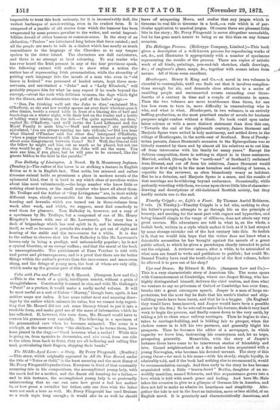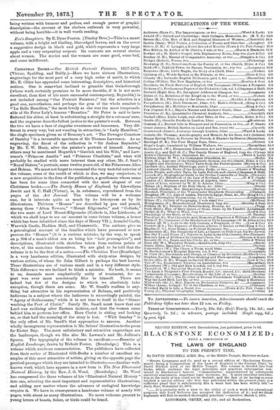Ups and Downs. By Edward E. Halo. (Sampson Low and
Co.)— This is a very characteristic story of American life. The scene opens with Commencement at Cambridge, where one Jasper Rising, who has highly distinguished himself, delivers the chief oration, and does what we venture to say no prizeman of Oxford or Cambridge has ever done, breaks into a great extempore speech. Jasper is a man of large ex- pectations, but the next day he finds that his uncle's timber and ship- building yards have been burnt, and that he is a beggar. (In England they would have been insured, and Jasper would have been a possible gainer by the fire.) So he sets out to make his fortune, finds it very hard work to begin the process, and finally comes down to the very earth, by taking a job to clean some railway carriages. Then he begins to rise ; takes to carriage-building, and is bidding fair to prosper, when the cholera comes in to kill his two partners, and generally blight his prospects. Then he becomes the editor of a newspaper, in which capacity we leave him, instructing his countrymen and, let us hope, prospering generally. Meanwhile, with the story of Jasper's fortunes there have come to be interwoven stories of friendship and love. Casual neighbourhood at a fire makes him acquainted with a young Norwegian, who becomes his devoted servant. The story of this young Oscar—for such is his name—with his steady, simple loyalty, is admirably told, and if the book had nothing else to recommend it, would be recommendation enough. And then early in the story he has become acquainted with a little " brown-faced " Bertha, daughter of an un- worldly musician, named Schwartz, and this acquaintance grows into a love which is told with much grace and feeling. And here Mr. Hale takes the occasion to give us a glimpse of German life in America, and does not fail to make us admire its heartiness and simplicity. Alto- gether the tale is not in the least an imitation, more or less skilful, of an English novel. It is genuinely and characteristically American, and
being written with humour and pathos, and enough power of graphic description—the account of the cholera outbreak is very powerful, without being horrible—it is well worth reading.







































 Previous page
Previous page